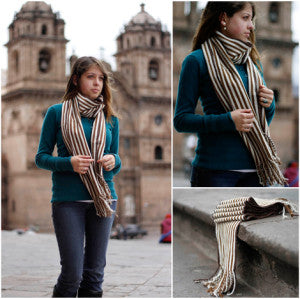"Ending is better than mending. The more stitches, the less riches."
Aldous Huxley, Brave New World.
When we buy clothes nowadays it's rarely with the idea that they will last us for years to come. It's happened more than once: I take a look in my wardrobe, sigh over the fact I have nothing to wear for some party tonight, go to the shops and buy a new shirt. The same night someone spills red wine over the shirt, another sigh ‘oh well’ the next day the shirt is in the rubbish bin. The very idea of taking the time and money to take the shirt to get dry cleaned is ridiculous, primarily because it will cost more than the shirt did in the first place…
In a society where you can buy an outfit for less than a warm meal have clothes become so disposable to us that at the first sign of flaw or at the end of the fashion season we simply discard them like so much rubbish? The above quote is from a futuristic novel which describes a society so bent on consumerism that mending clothes is unheard of, and as such clothes no longer have any value.
Our ethos is just the opposite of this; the pieces that are created for Threads of Peru are handcrafted by Andean women to be well made, individual and from a fashion point of view, timeless. Our products are designed to last for years to come and are not gimmicky or faddy.
 We feel that when our customers buy a piece from us they are making an investment, both in a beautiful piece of apparel for the future but also in the lives of the craftswomen who created it. The piece is 100% organic, soft, and warm. Particularly the natural alpaca pieces are in soft browns, grays and hues that are classic colours that can complement the look of the season. We realize that when it comes to clothes, people are going to buy something because it appeals to them and they feel attractive wearing it. However, we do encourage you to think of a Threads of Peru purchase as something that will last for much longer than a season. It was not mass produced, but created using an ancient tradition and purchased fairly to ensure the continuity of this rare craft.
We feel that when our customers buy a piece from us they are making an investment, both in a beautiful piece of apparel for the future but also in the lives of the craftswomen who created it. The piece is 100% organic, soft, and warm. Particularly the natural alpaca pieces are in soft browns, grays and hues that are classic colours that can complement the look of the season. We realize that when it comes to clothes, people are going to buy something because it appeals to them and they feel attractive wearing it. However, we do encourage you to think of a Threads of Peru purchase as something that will last for much longer than a season. It was not mass produced, but created using an ancient tradition and purchased fairly to ensure the continuity of this rare craft.
Frankie Ginnett, Project Assistant and Volunteer Co-ordinator

